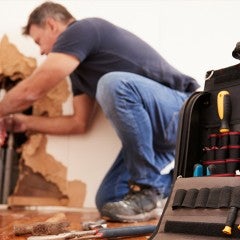But maintaining a home and making repairs is costly, and public and nonprofit organizations are often strained to meet the needs of those who can’t afford to have the work done on their own.
“We know that keeping a home in good working order is good for protecting wealth and is good for the health and safety of its occupants,” said Dan Potter, director of the Kinder Institute’s Houston Population Research Center, which published the report based on survey data from more than 5,300 Harris County residents. “We learned that there is also a relationship between repairs and how someone feels about their neighborhood. Households needing more repairs tended to be in areas perceived to be getting worse rather than thriving.”
What needs to be repaired?
For its study, the Houston Population Research Center divided housing repair responses into two categories: HVAC or plumbing-related needs, and safety and structural-related needs.
HVAC or plumbing-related needs included a broken HVAC system, hot water not running, burst pipes and other plumbing-related issues. About 57% of survey respondents said they had at least one such repair need.
Safety and structural-related needs included broken locks, broken doors or windows, leaking ceilings or roofs, and flood or water damage. Twenty-eight percent of respondents said they had at least one of these repair needs.
Appliance issues were excluded from the analysis.
Where are repair needs concentrated?
The study found that the need for housing repairs was widespread across the county. Significant concentrations of need were not necessarily associated with homeownership status, income, race or other demographics.
Additionally, neighborhoods most in need of repairs — and the types of repairs needed — were not necessarily grouped together. For instance, 69% of responding residents in the Braeswood, Willow Meadows and Meyerland area reported their plumbing or HVAC system needed repair. Greater Jersey Village (68.7%) to the north, Greater Sharpstown (64.6%) to the southwest, and the Heights and Lazybrook (64.4%) area in north central Houston reported similar prevalence of need. The areas with more structural and safety repair needs were Greater Spring and Aldine West (39%) in north Houston and Sunnyside and South Union (38%) on the southern side of the county.
Researchers noted in the report that residents who viewed their neighborhood as being in decline or having certain unwanted traits tended to be more likely to report their housing had been in need of repair. Respondents were asked whether their neighborhood experienced unpleasant smells, noise, street flooding, vandalism and illegal dumping, and whether their perception of the neighborhood was that it was “getting worse” or “alive and thriving.”
Overall, 68% of people living in neighborhoods that are “getting worse” reported needing at least one repair on their home versus 57% of those whose neighborhoods are “getting better.” About 33% of those in “getting worse” neighborhoods reported needing at least two repairs.
Public programs
As the Kinder Institute study notes, publicly funded programs are critical in assisting low-income homeowners, but they can have stringent requirements or simply do not have enough funding to meet the need. The city of Houston’s Single-Family Home Repair Program, for example, is out of funds and is no longer accepting applicants.
“Even though we did not find significantly higher rates of need for lower-income groups, it is important to remember that the actual financial impact and burden of any repair need is going to look a lot different for different household incomes,” said Anna Glanzer, a Kinder Institute research analyst and author of the brief. “And that is where assistance programs and nonprofit organizations can play an important role in helping to offset some of that burden for families in need.”
The Harris County Home Repair Program helps through grants or deferred payment loans to qualified older homeowners. Grants up to $40,000 are available for minor home repairs. Outside of Houston but still in the county, grants up to $40,000 are available for repairing and/or replacing water wells and septic systems. Fort Bend County has a similar program but has a waiting list of more than two years.
Other services that may help residents repair homes include Elder Options of Texas, which helps provide home modifications to make it easier and safer to manage activities; the Texas Veterans Home Improvement Program, which provides below-market interest rate home repair loans to qualified Texas veterans; and the Texas Department of Housing and Community Affairs and U.S. Department of Housing and Urban Development, which provide funds for home repair and weatherization.
Filling the gaps
With limited public dollars available for repairs, local nonprofit organizations step in. Their efforts are neither easy nor cheap, but even small fixes such as replacing broken windows or roof tiles can make a difference.
“It does not take a lot to make these people’s lives better,” said Christine Holland, CEO of Rebuilding Together Houston, which provides repair services to homeowners primarily in underserved Third Ward and East End neighborhoods, as well as countywide to veterans and others who qualify based on their income. “When you can do it, it’s a really good feeling. We’re proud of our work. We just haven’t served enough people yet.”
According to its 2024 organizational overview, Rebuilding Together Houston has helped more than 14,840 families since being founded 42 years ago — about one family per day — and its average cost to repair a home, including contractor and material costs, is about $27,000. Holland said the organization, which depends on donations and volunteers, primarily assists people of color, older adults and those with very low income.
“Those are the people that we were able to serve,” she said. “We’re really trying very hard to serve the poorest of the poor.”
Unfortunately, the needs are bigger than the resources available.
“We turn away 66% of the people that call us,” Holland said.
Another option is Houston Habitat for Humanity, which has programs to assist homeowners needing repairs. Its Critical Home Repair Program serves seniors and veterans, while its Disaster Home Repair Program assists low-income residents.
United Way’s 211 help line can connect residents needing home repair help to local service providers. So far this year, 2,345 requests have been made.
Texas Housers provides information on how to ask for help, including a link to templates from Keep Harris Housed for making written requests for repairs, which can be sent to landlords.



